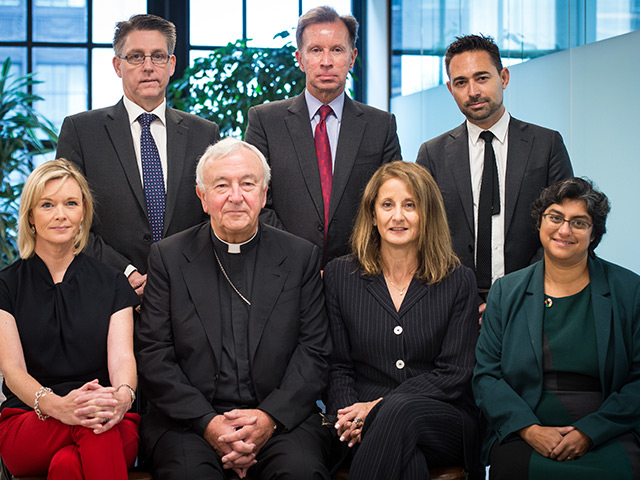
Cardinal Vincent Nichols, the Archbishop of Westminster, chaired the first Evening Standard round table on modern slavery today at the newspaper’s offices in west London.
Comprised of leading figures from business, law, philanthropy and the media, over the next months the panel will come up with proposals for combating slavery around the world.
These ideas will be presented at the Vatican in February, at the Santa Marta Group’s anti-slavery conference.
In his introduction, Cardinal Nichols said: “We’re all delighted the Evening Standard and Independent have decided to lend their weight to this issue. London is this centre of enterprise and prosperity, but there is also a dark underbelly.”
This week the Evening Standard, with its sister website The Independent, launched a special investigation into modern slavery in the UK. Working with the Independent Anti-Slavery Commissioner, Kevin Hyland, the investigation will be shining a light on slavery in its forms in the UK, showing readers what they can do to help and calling for specific action to fight the problem.
The National Crime Agency has estimated that there are tens of thousands of victims of modern slavery in the UK, yet only a tiny fraction of these are officially recognised. Not all are forced into sex work: car washes, nail bars and cannabis factories are other common areas of exploitation and abuse.
At the start of the meeting, the panel heard from a British survivor of sex trafficking. She spoke about the importance of testimony from victims, and of giving a voice to those who have none. Each member of the group then made a short presentation before a more general discussion.
Speaking by video, Paul Polman, the chief executive of Unilever, reiterated the need for a holistic approach, with governments, businesses and individuals pulling together. “It could have been us,” he said. “We are the lucky ones.”
The philanthropist John Studzinski said: “Around the world, we don’t yet have corporate leadership embracing ethical profit. A lot of it comes down to pension funds and asset managers. They need to ask themselves — is this profit ethical?”
He said consumers have a role in scrutinising their purchases and helping to name and shame companies that fail to be vigilant about modern slavery.
ITV News reporter Julie Etchingham, who will moderate the Santa Marta conference, said: “It’s a scandal that we can be sitting in this office and within a mile is somebody who’s been deprived of their liberty and shipped across a whole continent under false pretences… the more we can raise awareness, the better.”
Introducing experts from the worlds of business, law and policing on Evening Standard panel seeking action
Kevin Hyland, Independent Anti-Slavery Commissioner
Mr Hyland was a police officer for 30 years until retiring in 2014 as a detective inspector, having been head of the Met’s human trafficking unit. Hyland is the first IASC since the role was created by the Modern Slavery Act 2015.
Paul Polman, Unilever
Born in Holland, Mr Polman has been the chief executive of Unilever since 2009. He has been a ferocious advocate of sustainability in supply chains — ecological or human. He argues that customers have the power to inspire global change.
Yasmin Waljee, Hogan Lovells
A human rights lawyer and international pro bono director at her law firm, overseeing social finance work, Ms Waljee is also on the board of Mosaic, an initiative to help young Muslims in deprived areas.
Julie Etchingham, ITV News
Familiar to TV viewers as the presenter of Tonight and a newsreader on News At Ten, she has been reporting on modern slavery for 10 years. She will moderate the Santa Marta conference at the Vatican in February.
Monique Villa, Thomson Reuters Foundation
As chief executive of the Thomson Reuters Foundation, Ms Villa has oversight of its activities supporting journalism, women’s empowerment, the rule of law and human rights around the world. She has been a vocal campaigner against slavery.
Sir Matt Baggott, former Northern Ireland chief constable
Sir Matt joined the Metropolitan Police in 1978 and worked his way up to serving as chief constable of Northern Ireland from 2009 until 2014. He is president of the Christian Police Association and trustee of the International Needs charity.
Jean Baderschneider, Global Fund to End Slavery
She retired from ExxonMobil after 30 years as vice-president of global procurement. Now chief executive of the GFES, she is also on the board of the Polaris Project, which focuses on stopping human trafficking.
John Studzinski, The Blackstone Group
The Anglo-American worked in mergers and acquisitions at Morgan Stanley before joining Blackstone, where he is vice-chairman of investor relations and business development. A tireless philanthropic campaigner.
Take action to end slavery by going to the Evening Standard‘s online activity platform.